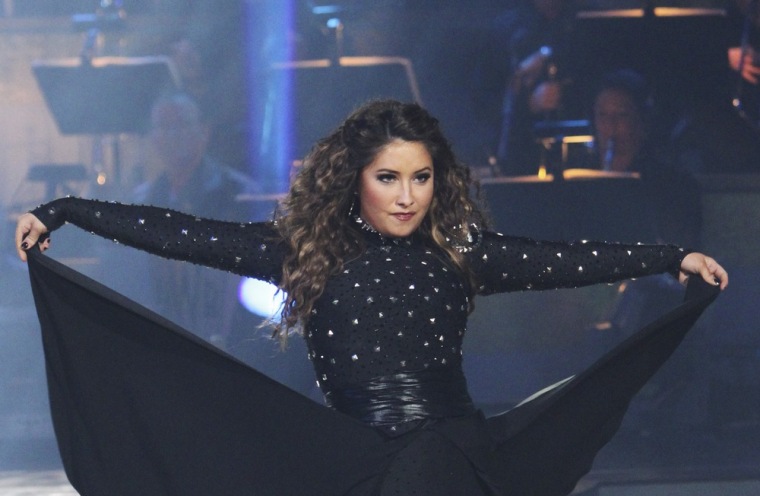Does Bristol Palin, the daughter of that politically powerful hockey mom from Alaska, have the best moves on "Dancing with the Stars"? Some critics say she's definitely improved as the season has progressed. But the judges consistently give her among the lowest marks -- meaning it's the people, the voters, who have kept her around for Monday night's finale.
And these voters, according to theories swirling on the Internet, appear to be politically motivated. Having Palin tear up the dance floor on national TV is considered a boost for the conservative Tea Party movement. To keep the votes coming in, the party is using social media effectively to rally the base behind the young Palin mom.
The campaign apparently includes exploitation of a loophole in ABC's e-mail voting feature. The loophole is explained as a technicality in the system that allows voters to register an infinite number of email addresses and vote, vote, vote. The e-mail addresses are never validated, such as what happens when you sign up for a Facebook or PayPal account.
"Lord have mercy, I voted for 3 hours online! I got 300 in," one Palin fan wrote in a comment on the HillBuzz blog, which is leading the charge on Bristol Palin's behalf.
ABC tries to safeguard against such abuse. "Computers must allow cookies, have Javascript enabled and have the latest version of Flash installed," the company explains on its Web site. The implication is that cookies are used to determine whether the computer user has already voted. An integrity assessment is conducted against each online vote, including security measures that are meant to catch and remove fraudulent voting.
The New York Daily News quoted the show's executive producer, Conrad Green, as saying that multiple e-mailed votes would be wiped out if they came from the same IP address -- though he declined to spell out exactly how the system matches up e-mails with those numerical Internet routing codes.
Even all of those safeguards may not be enough. The pro-Palin groundswell is reportedly leading ABC to consider changing its voting system to give more weight to the judges' assessment -- and less weight to the voice of the people.
Open voting process
Thad Hall is an associate professor of computer science at the University of Utah and a research affiliate with the Caltech/MIT Voting Technology Project. He told me that the voting systems on reality-TV shows such as "Dancing With the Stars" and "American Idol" are designed to gauge popular support for the various contestants, and "they do that by creating a very open process." In other words, this isn't supposed to be a "one person, one vote" election.
Stopping voter fraud is likely a low priority, Hall said. They could put in controls to more stictly authenticate voters such as requiring viewers to register through their cable box and limit households to a set number of votes. But at the end of the day, "the show is interested in one thing: they are interested in ratings," he said.
Measures to more strictly police the voting would only be put in place if the controversy about the fairness of the system drove viewers away. As long as the controversy boosts ratings, it's "a good thing."
Elections that matter
As important as Bristol Palin may be for keeping the Tea Party in the public eye, the fairness of the voting process on "Dancing With the Stars" pales in comparison with an election that actually has political consequences. Consider, for example, the race for the White House in 2012, in which Bristol's mom could be a contender.
In a real-world online election, steps can be taken to cut down on voter fraud, Hall said. The key is an authentication process that separates the act of registering to vote from the act of voting. Estonia, for example, has successfully held nationwide online voting, under conditions that independent security audits have shown to be effective and reliable. Estonia's rigorous authentication process makes it difficult for an individual to vote more than once.
Hall said nationwide online voting is unlikely to ever take hold in the U.S., but efforts are under way to make it an option for difficult-to-reach populations such as overseas military personnel. While there's "always a possibility of people doing bad things" with such a system, he said, election officials "can make it really hard to do bad things."
What do you think? Will online voting ever be secure and fair enough to reliably choose winners of reality shows and the White House? Feel free to weigh in with your comments below.
More on the Palins and reality-TV voting:
- Palin girls' hateful words common on Facebook
- Upset by Bristol's 'Dancing' luck, man shoots TV
- Palin's success raises tempers, boosts ratings
- Bristol says 'haters' are trying to 'destroy' her
- Poll: Sarah Palin most polarizing of 2012 crowd
John Roach is a contributing writer for msnbc.com. Connect with the Cosmic Log community by hitting the "like" button on the Cosmic Log Facebook page or following msnbc.com's science editor, Alan Boyle, on http://twitter.com/b0yle.
